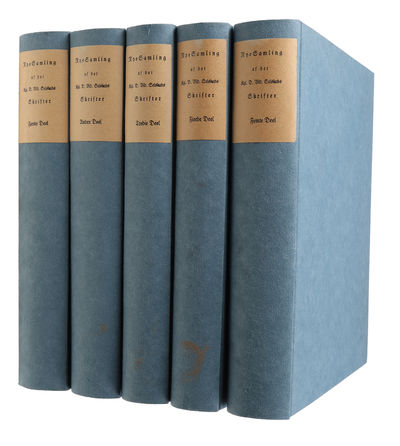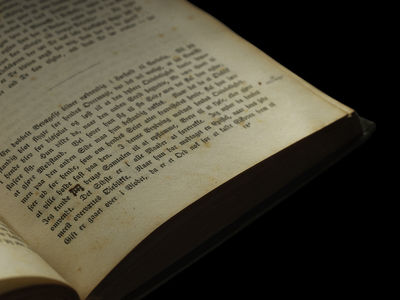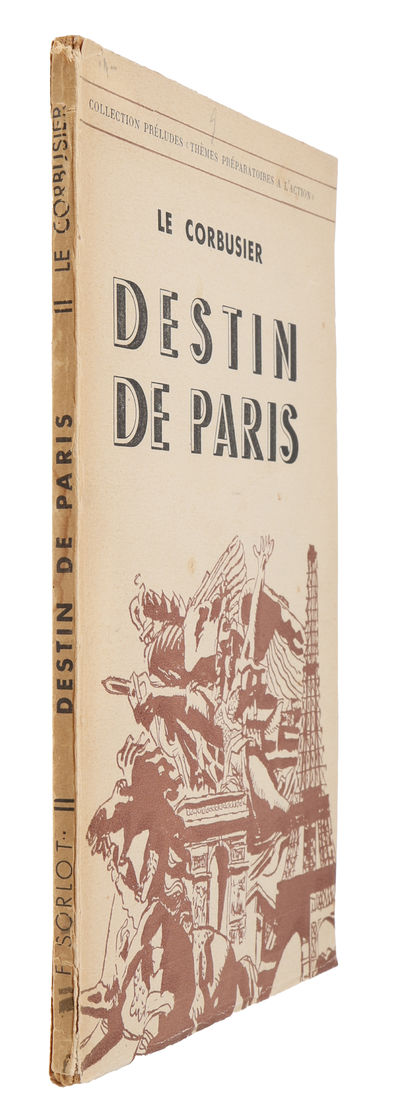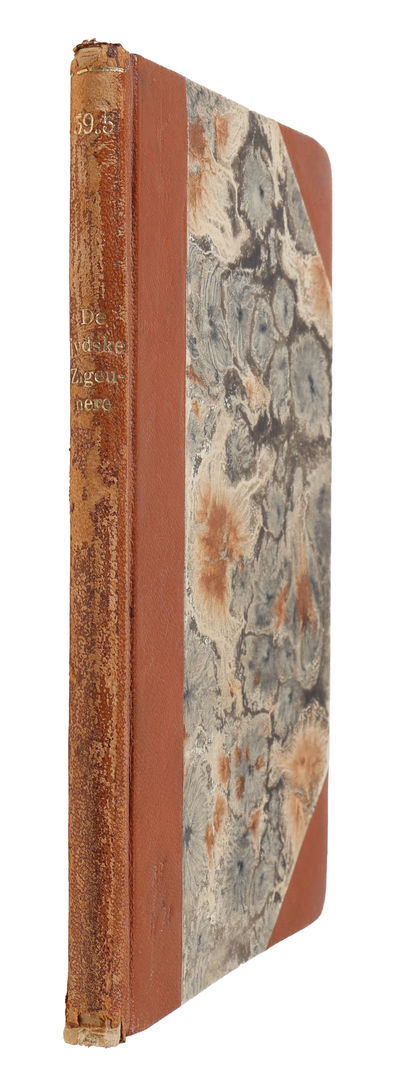GEORGE, HENRY.
Progress and Poverty. An Inquiry into the Cause of Industrial Depressions, and of Increase of Want with Increase of Wealth - the Remedy. Author's Edition. - ["UNDOUBTEDLY THE MOST REMARKABLE AND IMPORTANT BOOK OF THE PRESENT CENTURY"]
Herman H. J. Lynge & Søn A/S
lyn56003
San Francisco, Wm M.Hinton & Co, 1879. 8vo. In the original full cloth binding with gilt lettering to spine and a bit of blindstamping to boeards. A bit of light spotting to front board, spine faded, and capitals worn. Hinges internally a bit weak, and a professional closed tear to cloth at spine, barely noticeable. All in all an excellent copy in this fragile original binding. Internally very nice and clean. With the bookplate of Grove L. Johnson to inside of front board. (4), 512 pp.
The exceedingly scarce first edition, printed in merely 200 copies (namely the "Author's edition), of one of the most influential books ever published. Henry George's masterpiece of social reform, "Progress and Poverty", founded the ideology known as "Georgism", from which the worldwide social reform movement arose. The work initiated the Progressive Era and had a larger impact and "a wider distribution than almost all other books on political economy put together", as John Dewey put it (John Dewey's Foreword to Geiger's "The Philosophy of Henry George" (1933)). "The present century has been marked by a prodigious increase in wealth-producing power. The utilization of steam and electricity, the introduction of improved processes and labor-saving machinery, the greater subdivision and grander scale of production, the wonderful facilitation of exchanges, have multiplied enormously the effectiveness of labor.At the beginning of this marvelous era it was natural to expect, and it was expected, that labor-saving inventions would lighten the toil and improve the condition of the laborer; that the enormous increase in the power of producing wealth would make real poverty a thing of the past", is how Henry George introduces his grandiose work of social reform. But though people naturally expected labor-saving inventions to improve working- and living conditions for all, quite the opposite was the case. As towns and cities grew - and grow - and new technologies continually improve methods of production and exchange, so misery, poverty and crime continued - and continues - to increase. Henry George magnificently pointed out the association of progress with poverty and how that precisely came to be the cause of our social and political difficulties. He pointed out, how this problem, if unsolved, would mean the downfall of civilization. And he provided the remedy - "Deduction and induction have brought us to the same truth: Unequal ownership of land causes unequal distribution of wealth. And because unequal ownership of land is inseparable from the recognition of individual property in land, it necessarily follows that there is only one remedy for the unjust distribution of wealth: we must make land common property." More precisely, Henry George proposed a single tax on land values.Henry George's revolutionary first book, "Progress and Poverty" sold millions of copies and became a world-wide bestseller. In sales, it exceeded all other books except the Bible during the 1890s. The first edition, however, was only printed in 200 copies, designated "Author's Edition" and is very scarce - not least in the original binding."During the 1890s George, author of the 1879 bestseller Progress and Poverty, was the third most famous American, after Mark Twain and Thomas Edison. In 1896 he outpolled Teddy Roosevelt and was nearly elected mayor of New York.""When Progress and Poverty first came out in 1879, it started a worldwide reform movement that in the US manifested in the fiercely anti-corporate Populist Movement in the 1880s and later the Progressive Movement (1900-1920). Many important anti-corporate reforms came out of this period, including the Sherman Antitrust Act (1890), a constitutional amendment allowing Americans to elect the Senate by popular vote (prior to 1913 the Senate was appointed by state legislators), and the country's first state-owned bank, The Bank of North Dakota (1919)." (Stuart Jeanne Bramhall: Karl Marx vs Henry George, 2013).And the work continued to exercise its enormous influence throughout the Western world. According to a survey among British parliamentarians in 1906, the work was more popular than Walter Scott, John Stuart Mill, and William Shakespeare, and there is almost no end to the line of famous thinkers, who describe "Progress and Poverty" as life-changing, including George Bernard Shaw, Friedrich Hayek, H. G. Wells, and Leo Tolstoy, who like Winston Churchill, John Dewey, Bertrand Russell and many others claimed that it was impossible to refute Henry George on the land question. Philip Wicksteed characterized the book as "by far the most important work in its social consequences that our generation or century [1882] has seen", Alfred Russel Wallace hailed it as "undoubtedly the most remarkable and important book of the present century," and placed it above Darwin's "Origin of Species", Albert Einstein concluded "Men like Henry George are rare unfortunately. One cannot imagine a more beautiful combination of intellectual keenness, artistic form and fervent love of justice. Every line is written as if for our generation", etc., etc. PROVENANCE: Grove Lawrence Johnson (1841 -1926) was an American attorney and politician from California. In addition to serving in both houses of the state legislature, Johnson also served as a United States Representative.
The exceedingly scarce first edition, printed in merely 200 copies (namely the "Author's edition), of one of the most influential books ever published. Henry George's masterpiece of social reform, "Progress and Poverty", founded the ideology known as "Georgism", from which the worldwide social reform movement arose. The work initiated the Progressive Era and had a larger impact and "a wider distribution than almost all other books on political economy put together", as John Dewey put it (John Dewey's Foreword to Geiger's "The Philosophy of Henry George" (1933)). "The present century has been marked by a prodigious increase in wealth-producing power. The utilization of steam and electricity, the introduction of improved processes and labor-saving machinery, the greater subdivision and grander scale of production, the wonderful facilitation of exchanges, have multiplied enormously the effectiveness of labor.At the beginning of this marvelous era it was natural to expect, and it was expected, that labor-saving inventions would lighten the toil and improve the condition of the laborer; that the enormous increase in the power of producing wealth would make real poverty a thing of the past", is how Henry George introduces his grandiose work of social reform. But though people naturally expected labor-saving inventions to improve working- and living conditions for all, quite the opposite was the case. As towns and cities grew - and grow - and new technologies continually improve methods of production and exchange, so misery, poverty and crime continued - and continues - to increase. Henry George magnificently pointed out the association of progress with poverty and how that precisely came to be the cause of our social and political difficulties. He pointed out, how this problem, if unsolved, would mean the downfall of civilization. And he provided the remedy - "Deduction and induction have brought us to the same truth: Unequal ownership of land causes unequal distribution of wealth. And because unequal ownership of land is inseparable from the recognition of individual property in land, it necessarily follows that there is only one remedy for the unjust distribution of wealth: we must make land common property." More precisely, Henry George proposed a single tax on land values.Henry George's revolutionary first book, "Progress and Poverty" sold millions of copies and became a world-wide bestseller. In sales, it exceeded all other books except the Bible during the 1890s. The first edition, however, was only printed in 200 copies, designated "Author's Edition" and is very scarce - not least in the original binding."During the 1890s George, author of the 1879 bestseller Progress and Poverty, was the third most famous American, after Mark Twain and Thomas Edison. In 1896 he outpolled Teddy Roosevelt and was nearly elected mayor of New York.""When Progress and Poverty first came out in 1879, it started a worldwide reform movement that in the US manifested in the fiercely anti-corporate Populist Movement in the 1880s and later the Progressive Movement (1900-1920). Many important anti-corporate reforms came out of this period, including the Sherman Antitrust Act (1890), a constitutional amendment allowing Americans to elect the Senate by popular vote (prior to 1913 the Senate was appointed by state legislators), and the country's first state-owned bank, The Bank of North Dakota (1919)." (Stuart Jeanne Bramhall: Karl Marx vs Henry George, 2013).And the work continued to exercise its enormous influence throughout the Western world. According to a survey among British parliamentarians in 1906, the work was more popular than Walter Scott, John Stuart Mill, and William Shakespeare, and there is almost no end to the line of famous thinkers, who describe "Progress and Poverty" as life-changing, including George Bernard Shaw, Friedrich Hayek, H. G. Wells, and Leo Tolstoy, who like Winston Churchill, John Dewey, Bertrand Russell and many others claimed that it was impossible to refute Henry George on the land question. Philip Wicksteed characterized the book as "by far the most important work in its social consequences that our generation or century [1882] has seen", Alfred Russel Wallace hailed it as "undoubtedly the most remarkable and important book of the present century," and placed it above Darwin's "Origin of Species", Albert Einstein concluded "Men like Henry George are rare unfortunately. One cannot imagine a more beautiful combination of intellectual keenness, artistic form and fervent love of justice. Every line is written as if for our generation", etc., etc. PROVENANCE: Grove Lawrence Johnson (1841 -1926) was an American attorney and politician from California. In addition to serving in both houses of the state legislature, Johnson also served as a United States Representative.
Adresse:
Silkegade 11
DK-1113 Copenhagen Denmark
Telefon:
CVR/VAT:
DK 16 89 50 16
E-post:
Nettsted:
![Progress and Poverty. An Inquiry into the Cause of Industrial Depressions, and of Increase of Want with Increase of Wealth - the Remedy. Author's Edition. - ["UNDOUBTEDLY THE MOST REMARKABLE AND IMPORTANT BOOK OF THE PRESENT CENTURY"] (photo 1)](https://d3525k1ryd2155.cloudfront.net/h/891/031/1151031891.0.l.jpg)
![Progress and Poverty. An Inquiry into the Cause of Industrial Depressions, and of Increase of Want with Increase of Wealth - the Remedy. Author's Edition. - ["UNDOUBTEDLY THE MOST REMARKABLE AND IMPORTANT BOOK OF THE PRESENT CENTURY"] (photo 2)](https://d3525k1ryd2155.cloudfront.net/h/891/031/1151031891.1.l.0.jpg)
![Progress and Poverty. An Inquiry into the Cause of Industrial Depressions, and of Increase of Want with Increase of Wealth - the Remedy. Author's Edition. - ["UNDOUBTEDLY THE MOST REMARKABLE AND IMPORTANT BOOK OF THE PRESENT CENTURY"] (photo 3)](https://d3525k1ryd2155.cloudfront.net/h/891/031/1151031891.2.l.0.jpg)
![Progress and Poverty. An Inquiry into the Cause of Industrial Depressions, and of Increase of Want with Increase of Wealth - the Remedy. Author's Edition. - ["UNDOUBTEDLY THE MOST REMARKABLE AND IMPORTANT BOOK OF THE PRESENT CENTURY"] (photo 4)](https://d3525k1ryd2155.cloudfront.net/h/891/031/1151031891.3.l.0.jpg)
![Progress and Poverty. An Inquiry into the Cause of Industrial Depressions, and of Increase of Want with Increase of Wealth - the Remedy. Author's Edition. - ["UNDOUBTEDLY THE MOST REMARKABLE AND IMPORTANT BOOK OF THE PRESENT CENTURY"] (photo 5)](https://d3525k1ryd2155.cloudfront.net/h/891/031/1151031891.4.l.0.jpg)





